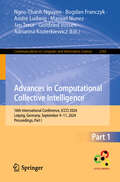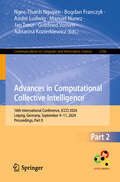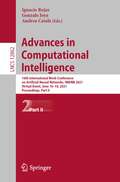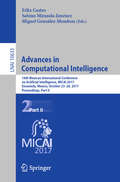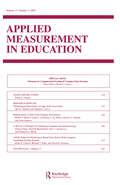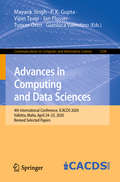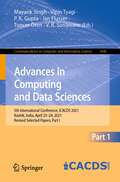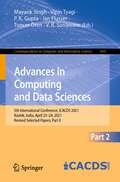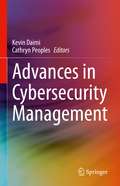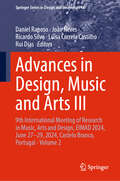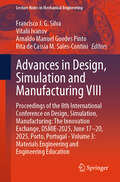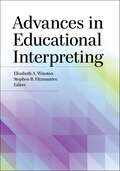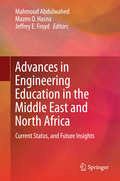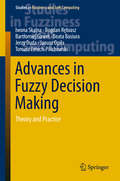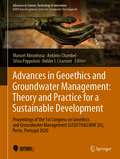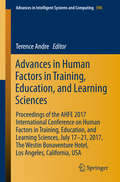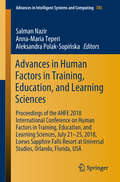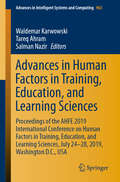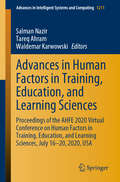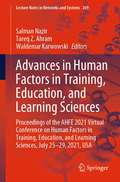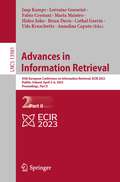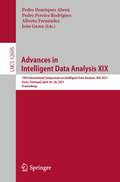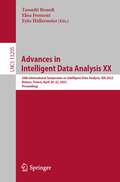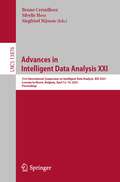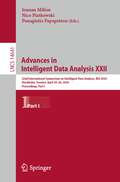- Table View
- List View
Advances in Computational Collective Intelligence: 16th International Conference, ICCCI 2024, Leipzig, Germany, September 9–11, 2024, Proceedings, Part I (Communications in Computer and Information Science #2165)
by Gottfried Vossen Bogdan Franczyk Jan Treur Ngoc-Thanh Nguyen André Ludwig Adrianna Kozierkiewicz Manuel NunezThis two-volume set CCIS 2165-2166 constitutes the refereed proceedings of the 16th International Conference on Computational Collective Intelligence, ICCCI 2024, held in Leipzig, Germany, during September 9–11, 2024. The 67 full papers included in this book were carefully reviewed and selected from 234 submissions. The main track, covering the methodology and applications of CCI, included: collective decision-making, data fusion, deep learning techniques, natural language processing, data mining and machine learning, social networks and intelligent systems, optimization, computer vision, knowledge engineering and application, as well as Internet of Things: technologies and applications. The special sessions, covering some specific topics of particular interest, included: cooperative strategies for decision making and optimization, security and reliability of information, networks and social media, anomalies detection, machine learning, deep learning, digital image processing, artificial intelligence, speech communication, IOT applications, natural language processing, innovative applications in data science.
Advances in Computational Collective Intelligence: 16th International Conference, ICCCI 2024, Leipzig, Germany, September 9–11, 2024, Proceedings, Part II (Communications in Computer and Information Science #2166)
by Gottfried Vossen Bogdan Franczyk Jan Treur Ngoc-Thanh Nguyen André Ludwig Adrianna Kozierkiewicz Manuel NunezThis two-volume set CCIS 2165-2166 constitutes the refereed proceedings of the 16th International Conference on Computational Collective Intelligence, ICCCI 2024, held in Leipzig, Germany, during September 9–11, 2024. The 67 full papers included in this book were carefully reviewed and selected from 234 submissions. The main track, covering the methodology and applications of CCI, included: collective decision-making, data fusion, deep learning techniques, natural language processing, data mining and machine learning, social networks and intelligent systems, optimization, computer vision, knowledge engineering and application, as well as Internet of Things: technologies and applications. The special sessions, covering some specific topics of particular interest, included: cooperative strategies for decision making and optimization, security and reliability of information, networks and social media, anomalies detection, machine learning, deep learning, digital image processing, artificial intelligence, speech communication, IOT applications, natural language processing, innovative applications in data science.
Advances in Computational Intelligence: 16th International Work-Conference on Artificial Neural Networks, IWANN 2021, Virtual Event, June 16–18, 2021, Proceedings, Part II (Lecture Notes in Computer Science #12862)
by Ignacio Rojas Gonzalo Joya Andreu CatalaThis two-volume set LNCS 12861 and LNCS 12862 constitutes the refereed proceedings of the 16th International Work-Conference on Artificial Neural Networks, IWANN 2021, held virtually, in June 2021.The 85 full papers presented in this two-volume set were carefully reviewed and selected from 134 submissions. The papers are organized in topical sections on Deep Learning for Biomedicine, Intelligent Computing Solutions for SARS-CoV-2 Covid-19, Advanced Topics in Computational Intelligence, Biosignals Processing, Neuro-Engineering and much more.
Advances in Computational Intelligence: 16th Mexican International Conference on Artificial Intelligence, MICAI 2017, Enseneda, Mexico, October 23-28, 2017, Proceedings, Part II (Lecture Notes in Computer Science #10633)
by Sabino Miranda-Jiménez Félix Castro Miguel González-MendozaThe two-volume set LNAI 10632 and 10633 constitutes the proceedings of the 16th Mexican International Conference on Artificial Intelligence, MICAI 2017, held in Enseneda, Mexico, in October 2017. The total of 60 papers presented in these two volumes was carefully reviewed and selected from 203 submissions. The contributions were organized in the following topical sections: Part I: neural networks; evolutionary algorithms and optimization; hybrid intelligent systems and fuzzy logic; and machine learning and data mining. Part II: natural language processing and social networks; intelligent tutoring systems and educational applications; and image processing and pattern recognition.
Advances in Computerized Scoring of Complex Item Formats: A Special Issue of Applied Measurement in Education
by Brian E. ClauserThis special issue was motivated by the move from research to operations for computerized delivery and scoring of complex constructed response items. The four papers presented provide an overview of the state of the art for such applications. The issue begins by describing the range of computer delivered formats and computerized scoring systems that are currently in use. The remaining papers provide three views of validity in the context of computer delivered and scoring assessments. It is hoped that together, these articles will provide the reader with both an appreciation of the state of the art for computer-automated scoring systems, as well as a perspective on the issues that must be considered and the evidence that must be collected to produce automated scoring systems that allow for valid inference.
Advances in Computing and Data Sciences: 4th International Conference, ICACDS 2020, Valletta, Malta, April 24–25, 2020, Revised Selected Papers (Communications in Computer and Information Science #1244)
by Tuncer Ören Jan Flusser Mayank Singh P. K. Gupta Vipin Tyagi Gianluca ValentinoThis book constitutes the post-conference proceedings of the 4th International Conference on Advances in Computing and Data Sciences, ICACDS 2020, held in Valletta, Malta, in April 2020.*The 46 full papers were carefully reviewed and selected from 354 submissions. The papers are centered around topics like advanced computing, data sciences, distributed systems organizing principles, development frameworks and environments, software verification and validation, computational complexity and cryptography, machine learning theory, database theory, probabilistic representations.* The conference was held virtually due to the COVID-19 pandemic.
Advances in Computing and Data Sciences: 5th International Conference, ICACDS 2021, Nashik, India, April 23–24, 2021, Revised Selected Papers, Part I (Communications in Computer and Information Science #1440)
by Tuncer Ören Jan Flusser Mayank Singh P. K. Gupta Vipin Tyagi V. R. SonawaneThis two-volume book constitutes the post-conference proceedings of the 5th International Conference on Advances in Computing and Data Sciences, ICACDS 2021, held in Nashik, India, in April 2021.*The 103 full papers were carefully reviewed and selected from 781 submissions. The papers in Part I and II are centered around topics like distributed systems organizing principles, development frameworks and environments, software verification and validation, computational complexity and cryptography, machine learning theory, database theory, probabilistic representations database management system engines, data mining, information retrieval query processing, database and storage security, ubiquitous and mobile computing, parallel computing methodologies, and others. *The conference was held virtually due to the COVID-19 pandemic.
Advances in Computing and Data Sciences: 5th International Conference, ICACDS 2021, Nashik, India, April 23–24, 2021, Revised Selected Papers, Part II (Communications in Computer and Information Science #1441)
by Tuncer Ören Jan Flusser Mayank Singh P. K. Gupta Vipin Tyagi V. R. SonawaneThis two-volume book constitutes the post-conference proceedings of the 5th International Conference on Advances in Computing and Data Sciences, ICACDS 2021, held in Nashik, India, in April 2021.*The 103 full papers were carefully reviewed and selected from 781 submissions. Part II is devoted to data sciences, organizing principles, medical technologies, computational linguistics etc.*The conference was held virtually due to the COVID-19 pandemic.
Advances in Cybersecurity Management
by Kevin Daimi Cathryn PeoplesThis book concentrates on a wide range of advances related to IT cybersecurity management. The topics covered in this book include, among others, management techniques in security, IT risk management, the impact of technologies and techniques on security management, regulatory techniques and issues, surveillance technologies, security policies, security for protocol management, location management, GOS management, resource management, channel management, and mobility management. The authors also discuss digital contents copyright protection, system security management, network security management, security management in network equipment, storage area networks (SAN) management, information security management, government security policy, web penetration testing, security operations, and vulnerabilities management. The authors introduce the concepts, techniques, methods, approaches and trends needed by cybersecurity management specialists and educators for keeping current their cybersecurity management knowledge. Further, they provide a glimpse of future directions where cybersecurity management techniques, policies, applications, and theories are headed. The book is a rich collection of carefully selected and reviewed manuscripts written by diverse cybersecurity management experts in the listed fields and edited by prominent cybersecurity management researchers and specialists.
Advances in Design, Music and Arts III: 9th International Meeting of Research in Music, Arts and Design, EIMAD 2024, June 27–29, 2024, Castelo Branco, Portugal - Volume 2 (Springer Series in Design and Innovation #48)
by Daniel Raposo João Neves Luísa Correia Castilho Rui Dias Ricardo SilvaThis book presents cutting-edge methods and findings that are expected to contribute to significant advances in the areas of communication design, fashion design, interior design and product design, as well as musicology and other related areas. It especially focuses on the role of digital technologies, and on strategies fostering creativity, collaboration, education, as well as sustainability and accessibility in the broadly-intended field of design. Gathering the second volume of the proceedings of the 9th EIMAD conference, held in hybrid format on June 27–29, 2023, and organized by the School of Applied Arts of the Instituto Politécnico de Castelo Branco, in Portugal, this book offers a timely guide and a source of inspiration for designers of all kinds, advertisers, artists, and entrepreneurs, as well as educators and communication managers.
Advances in Design, Simulation and Manufacturing VIII: Proceedings of the 8th International Conference on Design, Simulation, Manufacturing: The Innovation Exchange, DSMIE-2025, June 17–20, 2025, Porto, Portugal - Volume 3: Materials Engineering and Engineering Education (Lecture Notes in Mechanical Engineering)
by Vitalii Ivanov Francisco J. G. Silva Arnaldo Manuel Guedes Pinto Rita de Cassia M. Sales-ContiniThis book reports on advances in materials engineering, with a special emphasis on applying innovative approaches in coatings and protective technologies, particularly in the synthesis of new nanostructures, multilayer coatings, and ensuring antibacterial properties. It discusses wear behaviour for ferrous and non-ferrous materials. Further chapters report on the performance properties and mechanical characterization of composite and polymer materials for building efficiency and filtration applications. They also cover research results on cellulose, paper, and textile materials, focusing on strength properties. Yet, this book also describes innovative methods in engineering education, particularly the use of smart complexes and simulations to enhance students&’ competencies growth based on professional, environmental, and economic culture. Based on the 8th International Conference on Design, Simulation, Manufacturing: The Innovation Exchange (DSMIE-2025), held on June 17-20, 2025, in Porto, Portugal, this third volume of a 4-volume set provides academics and professionals with extensive information on technologies, trends, challenges, and practice-oriented experience in all the above-mentioned areas.
Advances in Educational Interpreting
by Elizabeth A. Winston; Stephen B. FitzmauriceIn this follow up to Educational Interpreting: How It Can Succeed, published in 2004, Elizabeth A. Winston and Stephen B. Fitzmaurice present research about the current state of educational interpreting in both K-12 and post-secondary settings. This volume brings together experts in the field, including Deaf and hearing educational interpreters, interpreter researchers, interpreter educators, and Deaf consumers of educational interpreting services. The contributors explore impacts and potential outcomes for students placed in interpreted education settings, and address such topics as interpreter skills, cultural needs, and emergent signers. Winston and Fitzmaurice argue massive systemic paradigm shifts in interpreted educations are as needed now as they were when the first volume was published, and that these changes require the collaborative efforts of everyone on the educational team, including: administrators, general education teachers, teachers of the deaf, interpreters, and counselors. The contributors to this volume address research-based challenges and make recommendations for how interpreting practitioners, and all members of the educational team, can enact meaningful changes in their work towards becoming part of a more comprehensive solution to deaf education.
Advances in Engineering Education in the Middle East and North Africa: Current Status, and Future Insights
by Mahmoud Abdulwahed Mazen O. Hasna Jeffrey E. FroydThis book provides a collection of the latest advances in engineering education in the Middle East and North Africa (MENA) region and sheds insights for future development. It is one of the first books to address the lack of comprehensive literature on undergraduate engineering curricula, and stimulates intellectual and critical discourse on the next wave of engineering innovation and education in the MENA region. The authors look at recent innovations through the lens of four topics: learning and teaching, curriculum development, assessment and accreditation, and challenges and sustainability. They also include analyses of pedagogical innovations, models for transforming engineering education, and methods for using technological innovations to enhance active learning. Engineering education topics on issues such as construction, health and safety, urban design, and environmental engineering in the context of the MENA region are covered in further detail. The book concludes with practical recommendations for implementations in engineering education. This is an ideal book for engineering education academics, engineering curriculum developers and accreditation specialists, and deans and leaders in engineering education.
Advances in Fuzzy Decision Making: Theory and Practice (Studies in Fuzziness and Soft Computing #333)
by Iwona Skalna Bogdan Rębiasz Bartłomiej Gaweł Beata Basiura Jerzy Duda Janusz Opiła Tomasz Pełech-PilichowskiThisbook shows how common operation management methods and algorithms can beextended to deal with vague or imprecise information in decision-makingproblems. It describes how to combine decision trees, clustering,multi-attribute decision-making algorithms and Monte Carlo Simulation with themathematical description of imprecise or vague information, and how tovisualize such information. Moreover, it discusses a broad spectrum ofreal-life management problems including forecasting the apparentconsumption of steel products, planning and scheduling of production processes,project portfolio selection and economic-risk estimation. It is a concise, yetcomprehensive, reference source for researchers in decision-making anddecision-makers in business organizations alike.
Advances in Geoethics and Groundwater Management: Proceedings of the 1st Congress on Geoethics and Groundwater Management (GEOETH&GWM'20), Porto, Portugal 2020 (Advances in Science, Technology & Innovation)
by Silvia Peppoloni Helder I. Chaminé Manuel Abrunhosa António ChambelThis book gathers the peer-reviewed proceedings of the 1st congress on Geoethics & Groundwater Management (GEOETH&GWM'20), held in Porto, Portugal, in an online format on 18-22 May 2020. Hosted in School of Engineering (ISEP), Polytechnic of Porto based on Porto city (a UNESCO World Heritage Site), the international conference focused on what has now been dubbed “hydrogeoethics”, a novel transdisciplinary, scientific field integrating all dimensions of geoethics in groundwater science and practice. Given its scope, the book is of interest to all researchers and practitioners in the geosciences, hydrology, water resources, hydrogeology, natural resources management, environment, engineering, law, sociology, education, philosophy, culture, among others.This joint congress is the result of a collaborative agreement between the IAH (International Association of Hydrogeologists) and IAPG (International Association for Promoting Geoethics) and reflects the need for concerted actions to achieve sustainable development.The diversity, scale, significance and increasing magnitude of anthropogenic interactions with aquifers and groundwater, which often involve conflicting values or interests, call for analysis, discussions and decisions on the part of the agents involved, e.g. groundwater scientists, policymakers, managers, organisations, professionals and citizens. This approach calls for a responsible, sustainable and human approach to groundwater use and management.The groundwater community involved in the exploration and exploitation, use and management of this increasingly vital natural resource is becoming more and more aware that ethical issues pervade all our attitudes from concept to action and need to be addressed. Diverse values and cultures, science and education, law and policies, human and natural environments and the public and the economic sectors view groundwater and its value and/or role differently. The authors believe that in a globalised and interconnected world, common ground must be found in the interest of peace, human development and sustainability. The main topics covered here include:1. Fundamentals of hydrogeoethics: cultures, principles and geoethical values on groundwater science and engineering2. Lessons for a resilient and sustainable future with hydrogeoethics: case studies of geoethics in groundwater science-engineering, profession, and management3. Scientific and humanistic components of hydrogeoethics in groundwater education and professional training 4. Socio-hydrogeology and ethical groundwater management 5. Geoethics of decision making under uncertainty and ethical issues in neglecting groundwater functioning 6. Groundwater: geological, legal, social, and ethical challenges of a unique natural resource
Advances in Human Factors in Training, Education, and Learning Sciences: Proceedings of the AHFE 2017 International Conference on Human Factors in Training, Education, and Learning Sciences, July 17-21, 2017, The Westin Bonaventure Hotel, Los Angeles, California, USA (Advances in Intelligent Systems and Computing #596)
by Terence AndreThis book focuses on the importance of human factors in optimizing the learning and training process. It reports on the latest research and best practices and discusses key principles of behavioral and cognitive science, which are extremely relevant to the design of instructional content and new technologies to support mobile and multimedia learning, virtual training and web-based learning, among others, as well as performance measurements, social and adaptive learning and many other types of educational technologies, with a special emphasis on those important in the corporate, higher education, and military training contexts. Based on the AHFE 2017 Conference on Human Factors in Training, Education, and Learning Sciences, held July 17-21, 2017 in Los Angeles, California, the book offers a timely perspective on the role of human factors in education. It highlights important new ideas and will foster new discussions on how to optimally design learning experiences.
Advances in Human Factors in Training, Education, and Learning Sciences: Proceedings of the AHFE 2018 International Conference on Human Factors in Training, Education, and Learning Sciences, July 21-25, 2018, Loews Sapphire Falls Resort at Universal Studios, Orlando, Florida, USA (Advances in Intelligent Systems and Computing #785)
by Salman Nazir Anna-Maria Teperi Aleksandra Polak-SopińskaThis book focuses on the importance of human factors in optimizing the learning and training process. It reports on the latest research and best practices and discusses key principles of behavioral and cognitive science, which are extremely relevant to the design of instructional content and new technologies to support mobile and multimedia learning, virtual training and web-based learning, among others, as well as performance measurements, social and adaptive learning and many other types of educational technologies, with a special emphasis on those important in the corporate, higher education, and military training contexts. Based on the AHFE 2018 Conference on Human Factors in Training, Education, and Learning Sciences, held July 21–25, 2018 in Orlando, Florida, USA on July 21–25, 2018, the book offers a timely perspective on the role of human factors in education. It highlights important new ideas and will fosters new discussions on how to optimally design learning experiences.
Advances in Human Factors in Training, Education, and Learning Sciences: Proceedings of the AHFE 2019 International Conference on Human Factors in Training, Education, and Learning Sciences, July 24-28, 2019, Washington D.C., USA (Advances in Intelligent Systems and Computing #963)
by Salman Nazir Waldemar Karwowski Tareq AhramThis book focuses on the importance of human factors in optimizing the learning and training process. It reports on the latest research and best practices and discusses key principles of behavioral and cognitive science, which are extremely relevant to the design of instructional content and new technologies to support mobile and multimedia learning, virtual training and web-based learning, among others, as well as performance measurements, social and adaptive learning and many other types of educational technologies, with a special emphasis on those important in the corporate, higher education, and military training contexts. Based on the AHFE 2019 Conference on Human Factors in Training, Education, and Learning Sciences, held on July 24-28, 2019, in Washington D.C., USA, the book offers a timely perspective on the role of human factors in education. It highlights important new ideas and will fosters new discussions on how to optimally design learning experiences.
Advances in Human Factors in Training, Education, and Learning Sciences: Proceedings of the AHFE 2020 Virtual Conference on Human Factors in Training, Education, and Learning Sciences, July 16-20, 2020, USA (Advances in Intelligent Systems and Computing #1211)
by Salman Nazir Waldemar Karwowski Tareq AhramThis book addresses the importance of human factors in optimizing the learning and training process. It reports on the latest research and best practices, and discusses key principles of behavioral and cognitive science, which are extremely relevant to the design of instructional content and new technologies to support mobile and multimedia learning, virtual training and web-based learning, among others, as well as performance measurements, social and adaptive learning and many other types of educational technology, with a special emphasis on those important in the corporate, higher education, healthcare and military training contexts. Gathering contributions to the AHFE 2020 Virtual Conference on Human Factors in Training, Education, and Learning Sciences, held on July 16–20, 2020, the book offers a timely perspective on the role of human factors in education. It highlights important new approaches and ideas, and fosters new discussions on how to optimally design learning experiences.
Advances in Human Factors in Training, Education, and Learning Sciences: Proceedings of the AHFE 2021 Virtual Conference on Human Factors in Training, Education, and Learning Sciences, July 25-29, 2021, USA (Lecture Notes in Networks and Systems #269)
by Salman Nazir Waldemar Karwowski Tareq Z. AhramThis book addresses the importance of human factors in optimizing the learning and training process. It reports on the latest research and best practices relating to the application of behavioral and cognitive science, and new technologies in the design of instructional and training content. It proposes innovative strategies for improving the learning and training experience and outcomes in different contexts, including lower and higher education, and different industry sectors. A special emphasis is given to digital and distance learning, gamification, and virtual training. Gathering contributions to the AHFE 2021 Conference on Human Factors in Training, Education, and Learning Sciences, held virtually on July 25-29, 2021, from USA, this book offers extensive information and a thought-provoking guide for both researchers and practitioners in the field of education and training.
Advances in Information Retrieval: 45th European Conference on Information Retrieval, ECIR 2023, Dublin, Ireland, April 2–6, 2023, Proceedings, Part II (Lecture Notes in Computer Science #13981)
by Brian Davis Hideo Joho Fabio Crestani Cathal Gurrin Lorraine Goeuriot Jaap Kamps Udo Kruschwitz Maria Maistro Annalina CaputoThe three-volume set LNCS 13980, 13981 and 13982 constitutes the refereed proceedings of the 45th European Conference on IR Research, ECIR 2023, held in Dublin, Ireland, during April 2-6, 2023. The 65 full papers, 41 short papers, 19 demonstration papers, 12 reproducibility papers consortium papers, 7 tutorial papers, and 10 doctorial consortium papers were carefully reviewed and selected from 489 submissions. The book also contains, 8 workshop summaries and 13 CLEF Lab descriptions. The accepted papers cover the state of the art in information retrieval focusing on user aspects, system and foundational aspects, machine learning, applications, evaluation, new social and technical challenges, and other topics of direct or indirect relevance to search.
Advances in Intelligent Data Analysis XIX: 19th International Symposium on Intelligent Data Analysis, IDA 2021, Porto, Portugal, April 26–28, 2021, Proceedings (Lecture Notes in Computer Science #12695)
by João Gama Pedro Henriques Abreu Alberto Fernández Pedro Pereira RodriguesThis book constitutes the proceedings of the 19th International Symposium on Intelligent Data Analysis, IDA 2021, which was planned to take place in Porto, Portugal. Due to the COVID-19 pandemic the conference was held online during April 26-28, 2021.The 35 papers included in this book were carefully reviewed and selected from 113 submissions. The papers were organized in topical sections named: modeling with neural networks; modeling with statistical learning; modeling language and graphs; and modeling special data formats.
Advances in Intelligent Data Analysis XX: 20th International Symposium on Intelligent Data Analysis, IDA 2022, Rennes, France, April 20–22, 2022, Proceedings (Lecture Notes in Computer Science #13205)
by Elisa Fromont Eyke Hüllermeier Tassadit BouadiThis book constitutes the proceedings of the 20th International Symposium on Intelligent Data Analysis, IDA 2022, which was held in Rennes, France, during April 20-22, 2022. The 31 papers included in this book were carefully reviewed and selected from 73 submissions. They deal with high quality, novel research in intelligent data analysis.
Advances in Intelligent Data Analysis XXI: 21st International Symposium on Intelligent Data Analysis, IDA 2023, Louvain-la-Neuve, Belgium, April 12–14, 2023, Proceedings (Lecture Notes in Computer Science #13876)
by Siegfried Nijssen Bruno Crémilleux Sibylle HessThis book constitutes the proceedings of the 21st International Symposium on Intelligent Data Analysis, IDA 2022, which was held in Louvain-la-Neuve, Belgium, during April 12-14, 2023. The 38 papers included in this book were carefully reviewed and selected from 91 submissions. IDA is an international symposium presenting advances in the intelligent analysis of data. Distinguishing characteristics of IDA are its focus on novel, inspiring ideas, its focus on research, and its relatively small scale.
Advances in Intelligent Data Analysis XXII: 22nd International Symposium on Intelligent Data Analysis, IDA 2024, Stockholm, Sweden, April 24–26, 2024, Proceedings, Part I (Lecture Notes in Computer Science #14641)
by Nico Piatkowski Panagiotis Papapetrou Ioanna MiliouThe two volume set LNCS 14641 and 14642 constitutes the proceedings of the 22nd International Symposium on Intelligent Data Analysis, IDA 2024, which was held in Stockholm, Sweden, during April 24-26, 2024. The 40 full and 3 short papers included in the proceedings were carefully reviewed and selected from 94 submissions. IDA is an international symposium presenting advances in the intelligent analysis of data. Distinguishing characteristics of IDA are its focus on novel, inspiring ideas, its focus on research, and its relatively small scale.
